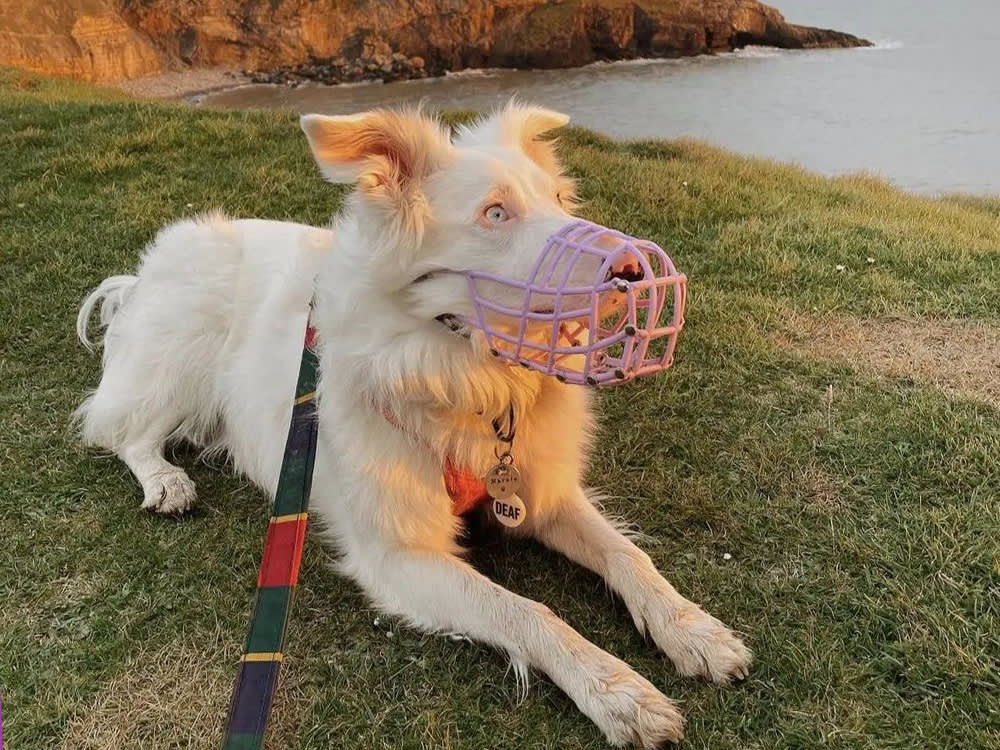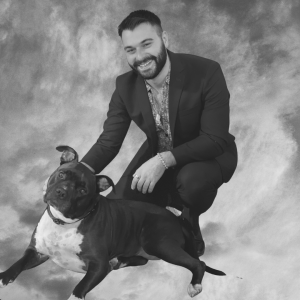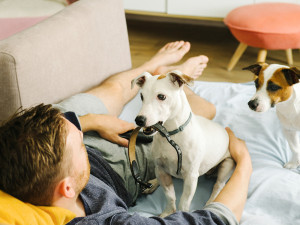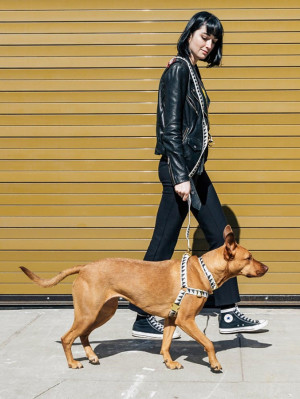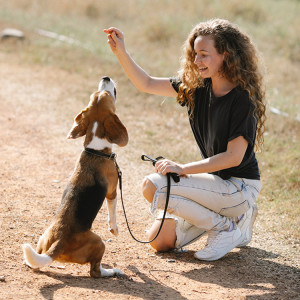Muzzle Up Project Wants You to Remove Your Judgment Goggles When You See a Muzzled Dog
How the misunderstood training tool actually empowers dogs to be “happy, fulfilled, and living their best lives.”
If there’s one thing we’ve learned over the past few years, it’s the importance of wearing a mask. Just as we’ve spent nearly three years combating misinformation and ignorance around face masks, many pet parents have been stuck in a similar loop for much longer when it comes to muzzles.
They know all too well the benefits of letting their dogs rock a Bane fit while enduring the negative stereotypes associated with looking like one of the Batman franchise’s most infamous villains. One organization has been working to ease some of that stress and teach other dog owners and bystanders not to fear muzzles — but instead celebrate them. The Muzzle Up! Projectopens in new tab is a San Francisco-based advocacy, training, and education service fighting stigmas against dog parents who muzzle their pets.
Beyond the Muzzle
The group was started in 2013 by Maureen Backman, a private dog trainer at the time, who had her ambitions set on altering common misconceptions about muzzle use.
“I remember as a new baby dog trainer seeing her posts and being so in love with the message she was sending, Sarah McManaman, director of operations at The Muzzle Up! Project, says. “There was always a big emphasis on empowering dogs and working together as a team. I really appreciated having that be one of my influences.”
How much do you spend on your pet per year?
Backman founded the organization hoping to normalize muzzle use and offer training without judgment. While she would eventually leave the Muzzle Up! Project to focus on a career in human therapy, her mission, and the collaborative ethos she established remain.
Muzzle Up partners with trainers and rescues across the U.S. to alleviate fears about muzzling pups and help demonstrate how best to use them. The training tool has been historically misunderstood as merely a safeguard against biting, ultimately resulting in the assumption that any dog wearing one is dangerous.
Now, this concept isn’t entirely difficult to understand. If you saw someone walking around the park wearing a Hannibal Lecter mask, you’d probably cross the street, too. But with dogs, there are plenty of reasons unrelated to protecting flesh that one might wear a muzzle.
“Yes, muzzles do help prevent bites. But they also help dogs with certain medical conditions like PICA, where they compulsively want to eat non-food items,” McManaman explains.
She also notes that muzzles also help keep vet staffs safe; a panicked dog or one that is in pain is more likely to bite, even if it’s out of character. While it might be unlikely, a dog who is severely injured can lash out in an attempt to protect themself from further pain. If your dog understands how to properly wear a muzzle and is comfortable doing so, it’s less stressful for you and prevents a potentially terrible situation.
Educate, Educate, Educate
Of course, Muzzle Up doesn’t condemn those who are unaware of all the reasons why someone might muzzle their dog. Instead, the team sees it as an opportunity for some polite teaching.
“I feel like most people who are unaware of all the reasons someone may muzzle their dog assume that a muzzled dog must be a dangerous dog. We were all that person at one point, so when someone is questioning why your dog is muzzled or making assumptions that is an opportunity to gently educate,” says McManaman.
The online discourse around muzzles has become a major challenge for The Muzzle Up! Project’s mission — even from those who support it.
“A lot of what I do involves watching what goes on online in the dog world surrounding muzzles, dog ownership, and dog training. People post what they are doing or how they are training, and then the comment section is just everyone fighting amongst one another. Criticism leads to defensiveness, and someone who is defensive is not receptive to any information being provided,” McManaman explains, before advising that kindness is the best way to advocate for fearful or aggressive dogs and the use of muzzles.
She adds: “We were all once a person who didn’t know about muzzles and assumed that they were only for aggressive dogs or that a muzzled dog has an awful life. We know that those things aren’t true so we need to lead by example,” she implores.
Help Beat the Stigma
McManaman practices what she preaches with her own pets. Neither of her dogs technically need to be muzzled but both have experience with the training for the device. “Why? Because all dogs can benefit from having been conditioned to wear a muzzle,” she explains. “There are so many uses beyond just aggression that responsible dog ownership also includes proactively training your dog to wear a muzzle.“
Plus, one of her two pups is a Pit Bull and Rottweiler mix — giving McManaman a unique insight into one of the more complex muzzle battles.
“I think Pit Bull owners have a harder time coming to terms with muzzling their dog. They are already having to deal with the stigma of the breed and a lot of people who talk to me don’t want to muzzle their bully breeds out of fear that they may look mean or dangerous,” she explains. Thanks to decades of poor media representation resulting in negative public perceptions, Pit Bulls have long faced breed discrimination.
For Pittie owners, McManaman recommends fighting the urge to protect your dog’s image in favor of allowing them the convenience of looking like NBA player Richard Hamilton. “Let’s make one thing clear: Muzzles are for all breeds. Every dog can benefit from muzzle training and every dog has the propensity to bite,” she states.
If you want to get involved with Muzzle Up and support its mission, McManaman says there are few things more impactful and encouraging than using your own voice and platform: “Every time you post a video of your dog enjoying their day while wearing a muzzle, even if that only impacts one person, you are headed in the right direction. People need to see that muzzled dogs are happy, fulfilled, and living their best lives. The only way they are going to see that is if people are putting out the videos and pictures of that happening.”
